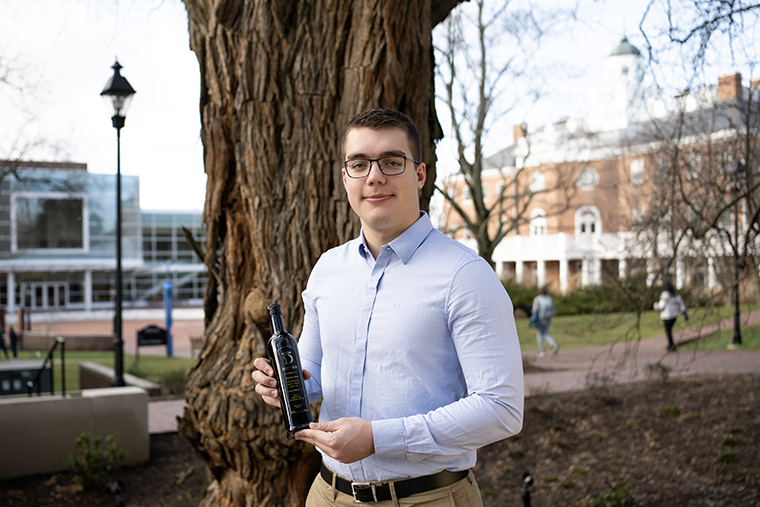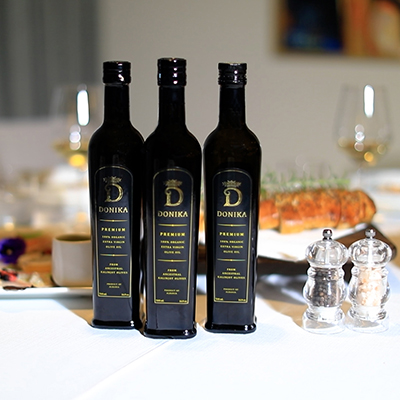Q&A with Bianti Danaj ’24
Business management major started olive oil business while a student.

Albanian native Bianti Danaj '24 has tapped into his country's tradition of hand-picking early-harvest olives and cold-extracting the oil. He launched a new business, Donika Olive Oil, while rounding out his senior year on campus.
This passion project grew from a class project to the basis for his senior capstone experience and into a full-fledged company. While developing his business plan for the capstone, he secured research funding from many sources at the College, including the Warehime Fund for Student Excellence in Business, the Elm Tree Fund, and the Office of the Provost.
Donika Olive Oil focuses on the quality of its product, with each Albanian-sourced dark green glass bottle being filled and capped to order moments before packaging and shipping directly to the consumer. Danaj has worked with the Office of Advancement and Alumni Engagement to connect with alumni, spread the word about his newly launched product, and scale up the business sustainably.
What is the history of Albanian olive oil?
I use the ancient Kalinjot variety of olives that go back hundreds of years to produce Donika Olive Oil. Kalinjot olives infuse the oil with a robust, earthy taste and aroma reflecting Albanian soil's very essence. This olive variety is native to Albania and became popular in the 1400s when a noblewoman, Andronika (Donika) Arianiti, got married and set the precedent that 10 new olive trees were to be planted at every Albanian wedding. These are the same trees that grace our existing groves and are 500 to 700 years old.
What inspired you to start your business?
Whenever I returned to the US from Albania, I always brought olive oil. Everyone I shared the oil with has been impressed with its remarkable flavor. The idea of supplying premium olive oil to the US came to me in 2020, but all I could see were barriers from funding to logistics. The concept stayed in the back of my mind, and I was always turning over ideas for making it a reality, but I couldn't figure out how to take the first step. In December 2022, a family friend mentioned his olive oil business was getting organic certification. The product wasn't only going to be certified, it tasted great. Even better, when I suggested a potential partnership, he was open to it. However, the obstacles remained the same; getting this product from Albania to America seemed impossible.
That's when my coursework at Washington College really kicked in. I had an entrepreneurship class with Professor Joseph Bauer. He asked each student to write down on a piece of paper what they would choose to pursue as a startup business. There was even a caveat to make sure it was something you would like to do and not to put any limitations on your imagination, basically, prompting us to think about what business we might embark on if we had unlimited resources. When I shifted my mindset that way, focusing on what I needed to do was much simpler than feeling trapped by what I couldn't do. I developed a draft business plan for Donika Olive Oil for this class, and when the class wrapped up, I decided to dedicate the summer to working on the startup.

Between July and December of this year, I've been feverishly working on the branding, website, sourcing labels, bottles, boxes, and caps to make this dream a reality. My capstone advisor, professor Thomas Tracy, assisted me in figuring out details with logistics and improving the business side of things. I've also been working directly with the crop scientists who are monitoring the agricultural practices of producing the olive oil. It's important to me to provide this premium olive oil directly to the consumer and ensure the freshest quality by connecting our customers with the Albanian farmers. I want to recreate a similar relationship to the one I had growing up with the producers of this special olive oil. That is the value of this niche market. We launched the website donikaoliveoil.com at the beginning of December.
What do you do for fun when you return to Albania?
Albania is north of Greece and east of Italy, on the Adriatic Sea. Vlorë, where I'm from, is directly across the water from a peninsula that's chock-full of coral and starfish, and my favorite thing to do is take a boat to go cliff jumping and explore the water caves. My friends and family pack picnic baskets for barbecues after scuba diving or snorkeling. I love day trips like this so much; I usually spend my birthday on the water, swimming and exploring the area.
What are some traditional Albanian foods?
There are a lot of influences from Italian cuisine, and due to our proximity to the ocean, the seafood is incredible and extremely fresh. We also have two traditional meat dishes. The first is akin to Eastern Shore scrapple, made from lamb organ meat and corn flour, and is called harapash. The second is tave kosi, which is lamb in a savory yogurt sauce served with rice.
What should Americans know about Albania?
Albania has only been a democracy for 30 years. In that short period of time, there has been a huge effort to elevate our tourism industry. We are one of the oldest civilizations in Europe, with abundant ancient archaeological sites and castles. Albanians consider themselves descendants of the ancient Illyrians, who traveled to the region around 2,000 BCE. My country is distinctive because of its history and mix of religion and politics; it's so different from any other European nation.
November 28th is Albanian Independence Day, which marks our independence from the Ottoman Empire in 1912. Albanians are incredibly patriotic. To kick off the celebration, we march in parades, the prime minister delivers a speech, and the festivities include celebrating our national heroes as well as performances from writers, artists, and singers. Dua Lipa is from Albania and performed at the celebrations this past year. To wrap up the day, there are usually some impressive fireworks.
What do you like most about Washington College and Chestertown, Maryland?
I really like the people; everyone is so friendly. I've traveled all over the United States, and people are not always as caring or supportive as they are in Chestertown. Even before I started the olive oil business, I felt compassion from the community. And now, when I visit shops in town to talk about the product, the small business owners are supportive and give me advice on how to grow the business. I have been surprised at how nice people are. It's truly vital to have that type of encouragement and assistance when you are trying to develop a business like mine.
— Hillary L. Bitting